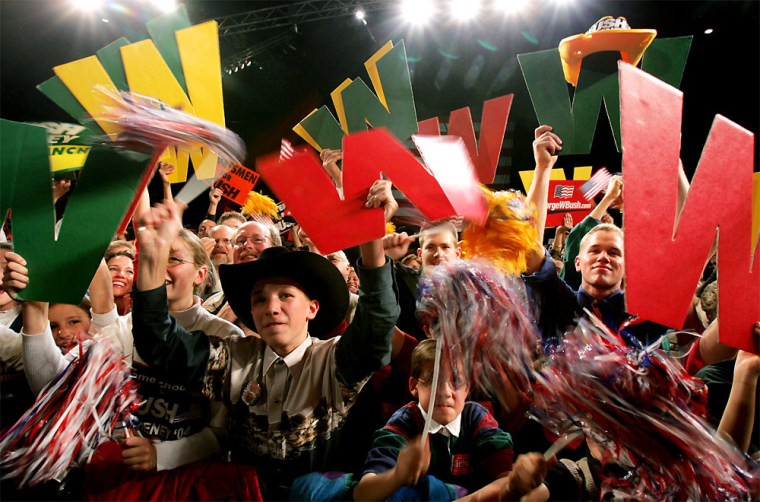In this tumultuous campaign, it often seemed that everyone, no matter how unlikely, wanted to take a turn at playing pundit or participant. People kept coming off the sidelines to run onto the field to tackle the other team’s quarterback.
Filmmaker Michael Moore, author Kitty Kelley, Boston Red Sox pitcher and Bush fan Curt Schilling, the Swift Boat Veterans for Truth, billionaire George Soros — this campaign seemed to have a cast of thousands.
True, some in the cast were reluctant participants or may have had mixed feelings: Dr. Judith Steinberg and Sen. John McCain come to mind, the former campaigning for her husband Howard Dean, the latter campaigning for President Bush.
By the final weekend it wasn’t just pollsters, but ordinary citizens who were engaged in mind-numbing Electoral College game theory: “Let’s see, if Bush loses Ohio but wins New Mexico and Iowa, then he’d need Hawaii’s four electoral votes.”
It ought not to have been surprising when, on the Friday before Americans walked to their schools and court houses to vote, Osama bin Laden decided to join the cast.
“Oh American people, my talk to you is about the best way to avoid another Manhattan, about the war, its causes, and results,” bin Laden declared in a tape broadcast by Arab TV network al Jazeera.
Was it an election eve offer of “peace in our time” comparable to Munich 1938? Although bin Laden said neither Bush nor Democratic nominee John Kerry could protect the American people, he spent time on the tape deriding the Bush dynasty, which he said was “characterized by hubris, arrogance, greed, and unlawful acquisition of money.”
In bin Laden’s view it was the elder George Bush who had “assign(ed) his sons to states,” Florida and Texas, so they could apply election “rigging” techniques learned from Middle Eastern autocrats.
Bin Laden took a scene from Moore’s Fahrenheit 911 to mock Bush for being “preoccupied with the little child's talk about her goat” as he read a children’s book in a Florida classroom after getting word of the first plane hitting the World Trade Center.
Hearing the same denunciations of the Patriot Act and the same anti-Bush invective from the mouth of bin Laden as Bush’s domestic critics use created a bizarre echo chamber effect.
But for Democrats, the bin Laden tape buttressed their criticism of Bush.
"Why haven't we captured him, if the Bush administration was going to be so effective in the war on terror?" demanded Kerry adviser Richard Holbrooke.
The tape underscored again the central question of the campaign: Which man could better wrap up the operation in Iraq and wage the war against bin Laden and the al Qaida warriors?
It was fitting that a campaign which ended on the fundamental question should also have begun there.
These were the turning points that brought either Kerry or Bush to brink of defeat:
First, in the summer of 2002, Bush and his aides sent signals that he intended to try to topple Saddam Hussein’s regime because of a fear that he had and might use chemical, biological or nuclear weapons.
In July of 2002, Kerry was voicing doubts about using force against Saddam Hussein, saying, “We lived with Russia for almost 50 years with the capacity to destroy us many times over and a policy of containment worked there. Why could not a policy of containment also work here, at least while you build up to that point of legitimacy?”
Despite misgivings, by the time the Senate voted on the resolution authorizing Bush to use the armed forces “as he determines to be necessary and appropriate in order to defend the national security of the United States against the continuing threat posed by Iraq,” Kerry had decided to vote to give Bush that authority.
It was a vote that would nearly cost Kerry the Democratic nomination as he vied with Howard Dean and other contenders.
When Kerry went to California in March of 2003, two days before U.S. forces invaded Iraq, Democratic activists booed and heckled him, over his vote for the war resolution.
Kerry tried to persuade his audience that his vote on the war resolution wasn't all that significant since Bush already had the authority to use military force without it.
But he added that, even despite congressional approval, Bush had still not earned "the legitimacy and consent of the American people."
The second turning point came when Dean’s candidacy, riding high in October of 2003, helped persuade Kerry to vote against Bush’s request for $87 billion in funds for operations in Iraq and Afghanistan.
Kerry explained he was voting “no” because Bush hadn’t sought a tax increase to help pay for the war and because Bush had not provided “fixed timetables and costs, for establishing civil, economic and political security in Iraq.”
More effectively than Bush has done, Vice President Dick Cheney questioned Kerry’s motives on the $87 billion in his debate with Sen. John Edwards, “If they couldn't stand up to the pressures that Howard Dean represented, how can we expect them to stand up to Al Qaida?”
The third turning point was the collapse of the Dean phenomenon on the night of the Iowa caucuses.
In Iowa, in the weeks leading up to January’s presidential caucuses, rank-and-file Democrats were besieged in their homes with repeat phone calls and front door visits from Dean’s “Perfect Storm” volunteers, including idealists from California and other states who’d flocked to Iowa to tell Democrats there why they simply had to vote for Dean.
The excess enthusiasm alienated enough Iowa voters to damage Dean and leave an opening for Kerry.
Democratic National Committee chairman Terry McAuliffe and other party leader had front-loaded the primary and caucus schedule so that it proved impossible for Kerry’s rivals to stop his momentum.

The campaign took another turn in May with the revelation of abuses of prisoners at the Abu Ghraib facility in Iraq.
For a time, Democrats pounded Bush on Abu Ghraib. But Kerry seemed hesitant to press the attack on this point, perhaps because it might appear that he was criticizing U.S. troops.
Yet another turning point — although it was more of a gradually forming realization — was the failure to find any stockpiles of chemical, biological or nuclear weapons in Iraq. Bush reframed his argument, saying that however misguided the intelligence he received prior to the invasion, he was right to order it.
“Do I forget the lessons of Sept. 11 and take the word of a madman, or do I take action to defend our country? Faced with that choice, I will defend America every time,” he told the Republican convention in September.
Bush’s unsteady performance in his first debate with Kerry on Sept. 30 marked another turning point in the campaign. Coming off an exuberant GOP convention, Bush had a chance to knock Kerry to the canvas, but instead came across as peevish, defensive and short on specific facts.
While Iraq and terrorism dominated the race, a culture schism was tearing Bush voters apart from Kerry voters.
Bush and Kerry themselves seemed a bit uneasy in their debates when confronted with the issues of abortion or same-sex marriage, but a drive across Iowa and Wisconsin a few days before Election Day revealed the depths of that cultural schism. What a change it was from the last time America had been attacked: in World War II, domestic quarrels were mostly suspended “for the duration.”
Adults spend an average of more than three hours each day listening to the radio and well over two hours in their cars each day. So radio is how campaigns often can grab voters with more direct, unvarnished language than in TV spots.
Judging by the radio ads, for Bush foes, the economy and environmental protection are what matters; for Kerry foes, the moral and social issues are what count most.
“Our way of life is under attack by Hollywood liberals like Michael Moore, their allies in the media, and Eastern elitists who want to impose their values on us,” warned one Republican National Committee radio spot heard repeatedly on Iowa radio stations. “The Left has launched a massive assault with their billions, tearing down Republican leaders who have made us proud. But we will not be defeated.”
A few minutes later, listeners heard an ad from the United Auto Workers, which deftly used a sound bite of Bush during the final debate when Bob Schieffer asked him who was responsible for rising medical insurance costs.
“Gosh, I sure hope it’s not the administration,” Bush cracked with an unseemly chuckle.
“America’s health care crisis — it’s no joke, Mr. President,” scolded the ad’s female narrator.
A short time later, radio listeners heard from the National Right to Life political action committee denouncing Kerry who “voted six times, every chance he got, to keep partial birth abortion legal.”
Moments later, the Environmental Alliance told listeners Bush “has made it virtually impossible to safeguard our kids from poisons.”
Bush air pollution policy, it alleged, had caused “dramatic increases in the risks of asthma, cardiovascular disease, brain damage, even death. ... Remember, the biggest dangers usually aren’t from far away; the biggest dangers are often very close to home.”
In the end which will move voters more, the dangers from far away, personified by Osama bin Laden, or the dangers close to home?
And which candidate can keep far-away dangers from coming home as they did on Sept. 11? On Tuesday, at long last, the voters can give their answers to those questions.
